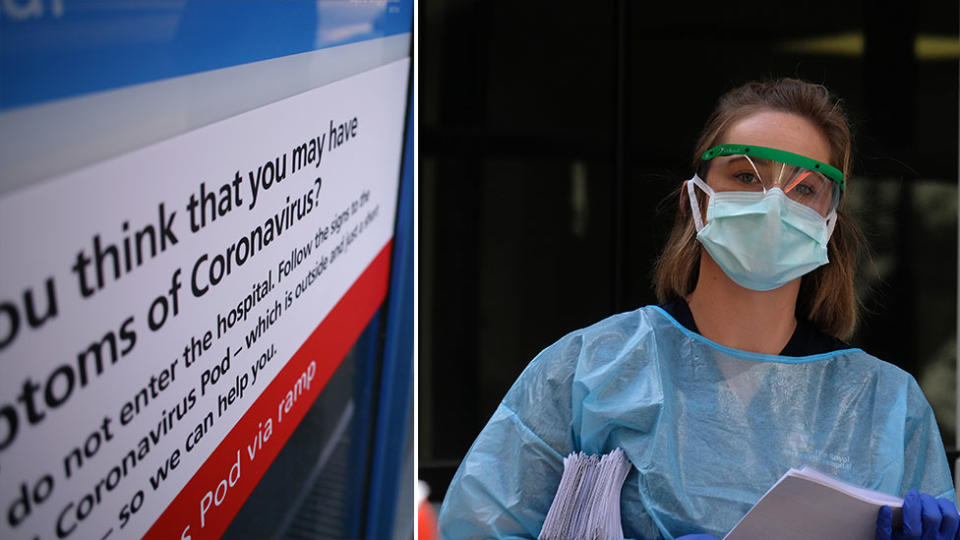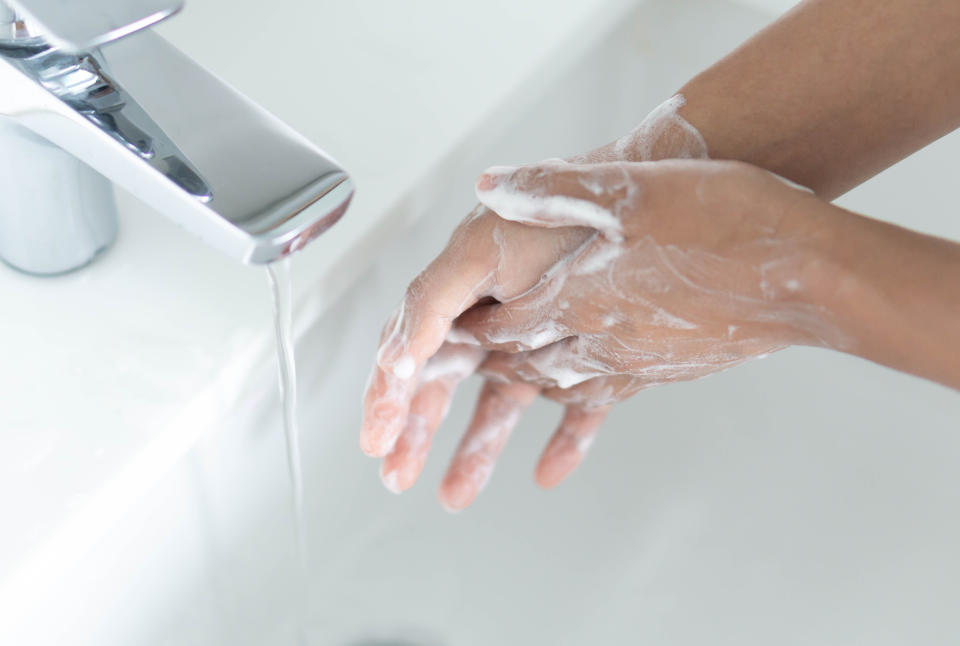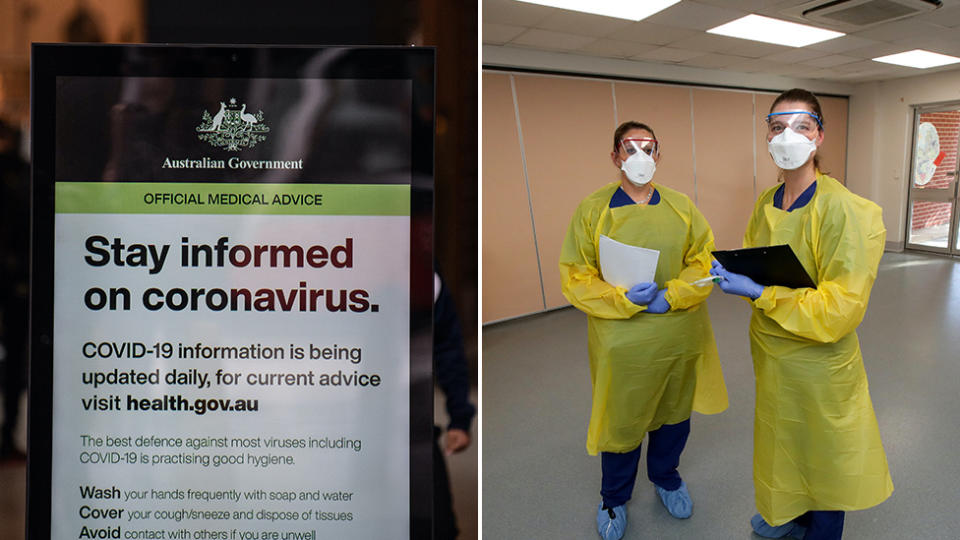What should I do if I think I have coronavirus?
Coronavirus has spread across the world and it is important you know what to do if you suspect you may have contracted the disease.
On Wednesday there were more than 550 confirmed cases of COVID-19 in Australia, and more than 200,000 cases around the world.
Here is everything you need to know about what you should do if you think you have coronavirus.
What are the symptoms of the coronavirus?
The most common symptoms of the coronavirus are fever, a dry cough and tiredness, however some patients may also experience aches and pains, nasal congestion, runny nose, sore throat or diarrhoea, according to the World Health Organisation.
“These symptoms are usually mild and begin gradually,” WHO says.
“Some people become infected but don’t develop any symptoms and don't feel unwell.”

WHO also says people who experience symptoms such as a cough, fever or difficulty breathing should seek medical attention.
Symptoms can vary from a mild illness to pneumonia, according to the Australian Government.
What do I do if I have symptoms?
If you are unwell, or you think you have the symptoms of COVID-19, the Australian Government’s Department of Health advises you to seek medical attention.
There is a national Coronavirus Health Information Line 1800 020 080 which you can call to get advice on your symptoms 24 hours a day, seven days a week.

Each state and territory in Australia has different guidelines for how you can get tested. It is important you follow relevant information provided by each state or territory government.
If you are suffering serious symptoms such as having difficulty breathing call Triple-0 for medical attention.
Criteria for testing
There is strict criteria someone must meet before they are tested at a medical facility.
According to the Department of Health, you will only be tested currently if:
You have returned from overseas in the past 14 days and you develop respiratory illness with or without fever.
You have been in close contact with a confirmed COVID-19 case in the past 14 days and you develop respiratory illness with or without fever.
You have severe community-acquired pneumonia and there is no clear cause.
You are a healthcare worker who works directly with patients and you have a respiratory illness and a fever.
Do I need to self-isolate?
If you feel unwell or exhibit any of the coronavirus symptoms you should isolate yourself to prevent further spread of the disease.
The Australian Government’s Department of Health advises if you have been in exposed to the virus, you might be asked to stay at home.
Anyone who is returning from overseas is required to self-isolate for 14 days, regardless if you have symptoms or not.
People who have had close contact with a confirmed case must also self-isolate, even if they’re not showing any symptoms, the Department of Health says.
How should I protect the older people in my life?
While everyone is at risk of contracting the coronavirus, the elderly and people with underlying medical issues are most at risk of developing more severe symptoms.
The federal government has now limited visiting aged-care facilities to short, two-person visits once a day, per resident.
Right now it is important to practice good hygiene and social distancing.
Cover your mouth with your elbow or a tissue if you sneeze or cough and dispose of tissues properly.
Wash your hands with soap and water constantly, the Australian Government also recommends doing so before and after eating and after going to the toilet.
And yes, there is a correct way to wash your hands.

If you cannot wash your hands, use an alcohol-based hand sanitiser.
Constantly clean and sanitise frequently-used objects like mobiles, keys and wallets.
Avoid contact with others if you are sick, and stay more than 1.5 metres away from people.
Social distancing is an effective measure to slow the spread of the virus.
Minimise physical contact with people at high-risk, like older people and those with exisiting health conditions to protect them.
What are the symptoms of coronavirus and how does it spread?
Doctor 'inundated' with patients clears up coronavirus confusion
Should I go to the doctor’s surgery?
You should seek medical attention if you are showing symptoms of COVID-19.
Don’t just turn up at the doctor’s surgery. It is best to call ahead and give the surgery the heads-up, and follow precautions and instructions you are given.
It is important you communicate with your doctor – make them aware of your symptoms, travel history and if you have recently been in contact with someone who is unwell.
A doctor will inform you if you should be tested.
Should I go to restaurants or events?
If you have been confirmed to have the coronavirus, you should not leave your home and remain in self-isolation.
Prime Minister Scott Morrison has announced tighter restrictions for all Australians.
All indoor-non-essential gatherings of 100 people or more are banned until further notice.
The only places exempt from this ban are office buildings, universities, child care facilities and hotels.
The ban does not affect public transport, airports, medical facilities, supermarkets and shopping centres, parliaments, courts or jails.
You should not be going anywhere – including restaurants or events – and remain at home if you think you have the virus.

Can I go outside?
No, if you have been told to self-isolate, you cannot go outside your property, but if you have a private outdoor area away from anybody else, you can enjoy the outdoors.
Can I travel overseas?
Australians have been advised not to travel overseas due to the coronavirus outbreak. If you have the coronavirus, you should definitely not be travelling at all.
“Do not go overseas. That is very clear that instruction,” Mr Morrison said to all Australians at a press conference on Wednesday.
Smart Traveller, the government’s offical advice for travel, is discouraging any travel to any overseas destination.
Not only has this been advised due to the higher risk of contracting COVID-19 overseas, but due to countries implementing restrictions on entry and movement, which may make your journey home more difficult.

Do you have a story tip? Email: newsroomau@yahoonews.com.
You can also follow us on Facebook, Instagram and Twitter and download the Yahoo News app from the App Store or Google Play.





